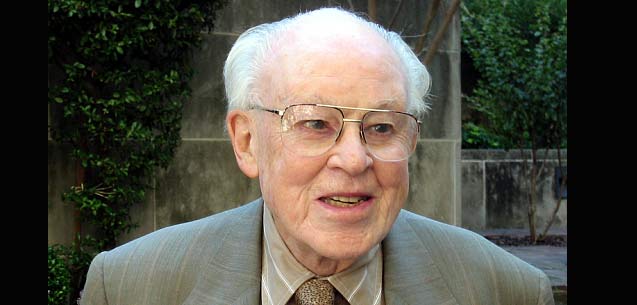Everett C. Parker, a longtime communications professor whose landmark court case and civil rights crusade held television and radio stations accountable for presenting racially biased programming and for failing to hire minorities, died on Sept. 17. He was 102.
A memorial service for Parker will be held on Saturday, Oct. 3rd at 11 a.m. at the Church of the Highlands in White Plains.
A minister and director of communications for the United Church of Christ in the 1960s, Parker petitioned the Federal Communications Commission to deny the renewal of a broadcast license to a TV station in 1964 for its failure to serve the public interest, as required by law.
He argued that although blacks made up 43 percent of the viewing audience, the station, WLBT in Jackson, Mississippi, did not cover civil rights news or the black community, and often referred to blacks pejoratively on the air. In 1969, future Supreme Court chief justice Warren E. Burger, then a federal appellate judge, agreed.
It was the first time that a license was lifted for a broadcast station’s failure to serve the public interest, and it ushered in an era in which activists, such as Parker and Ralph Nader, monitored and challenged broadcasters both on content and discriminatory hiring practices.
Parker joined the Fordham University communications and media studies faculty as an adjunct professor in 1983. He taught well into his 90s.
He co-founded the Donald McGannon Communication Research Center in 1986 with colleague Jack Phelan, professor emeritus of media and politics. The center is dedicated to furthering understanding of the ethical and social justice dimensions of media and communication technologies, particularly how such technologies affect the distribution of wealth, opportunities, and privileges within society.
“All we’ve ever wanted to do is make it possible for people to express themselves through the system of broadcasting,” he told The New York Times in 1983.
“If broadcasters are to serve the public interest, they need to be reminded that they serve all the publics.”
Former WFUV Manager Ralph Jennings joined Parker’s team at the United Church of Christ shortly after the initial challenge to FCC and worked for him for 12 years. He based his doctoral dissertation in part on Parker’s work.
“Right out of graduate school Everett offered me a job. It was a chance to take all that idealism and do something with it,” he said.
“Because of the things that he let the staff do, because he trusted them, and he knew they would do things his way, it was great thing to work for him. He was tough, but he was a compassionate person as well.”
Gwenyth Jackaway, PhD, associate chair of the Department of Communication and Media Studies, also met Parker when she was a graduate student and was becoming “disillusioned” with the slow pace of change in the industry. She recalled asking him how he managed to keep cynicism at bay as he fought the FCC and corporate media.
“The spirit of his response has stayed with me to this day. ‘We keep working towards reform,’ he told me, because there is no other choice. Giving up the fight is not an option. Working to bring about change gives purpose to our professional lives,” she said.
“There is no question that Everett Parker saw his media reform activism as doing God’s work in the world. He was an incredible inspiration, and was a staunch defender of the true spirit of what was originally intended by those who envisioned the broadcast media as servants of the public interest.”
Paul Levinson, PhD, professor of communication and media studies and former chair of the department, recalled that students regularly asked him how they could get into “Ev’s” course.
“He was in his 90s then, and had more energy than many faculty half his age. Fordham was fortunate indeed to have him in our midst,” he said.
Parker is survived by his daughters, Ruth Weiss and Eunice Kolczun; a son, the Rev. Truman E. Parker; seven grandchildren and seven great-grandchildren.
In lieu of flowers, contributions may be sent to the Emma L. Bowen Foundation, 300 New Jersey Avenue, N.W., Suite 700, Washington, DC 20001, or to the UCC’s Office of Communication, Inc.

